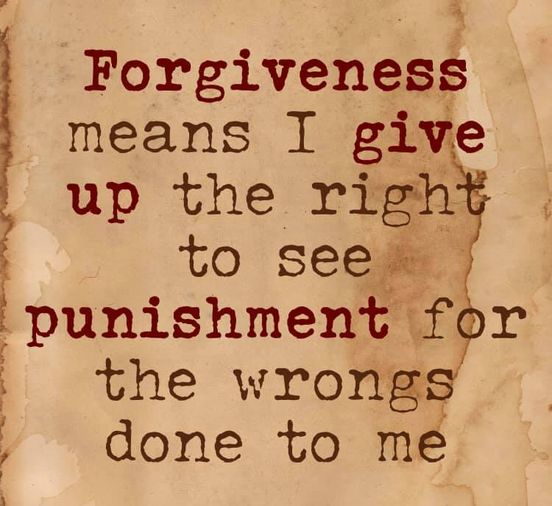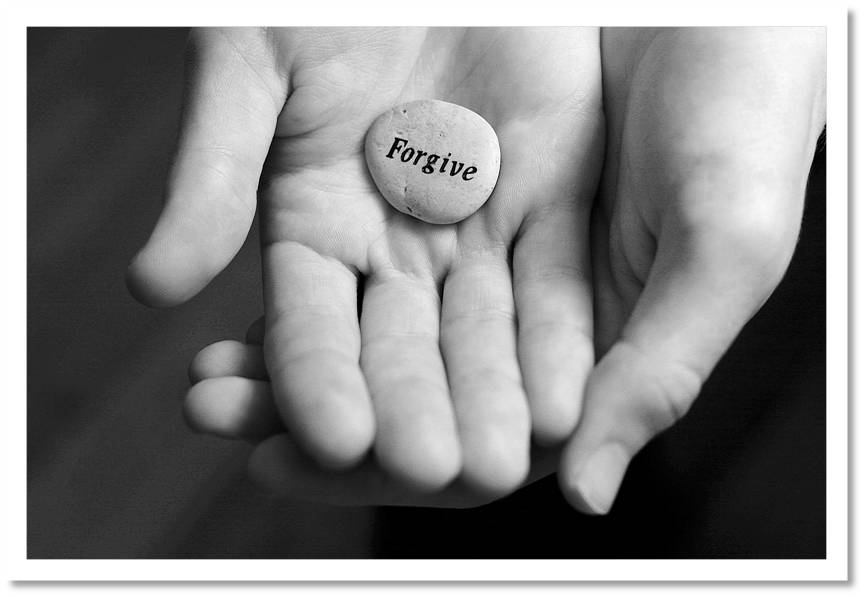-Papa, The Shack
It’s the hardest thing to give away
And the last thing on your mind today
It always goes to those who don’t deserve
It’s the opposite of how you feel
When the pain they caused is just too real
Takes everything you have to say the word
Forgiveness
Matthew West
Forgiveness is a beautiful thing…but it is not easy or fair
Like a multi-faceted diamond displays it’s sparkling beauty when on display, forgiveness is most beautifully on display on the cross. And it is on the cross that we also see that it is a sacrifice…and painful. In the midst of horrific pain, when speaking was excruciating and laborious, Jesus spoke words of forgiveness over those who put Him in that pain. “Father, forgive them.” To speak, He must push up with his legs, which were beaten…drag his lacerated back against the rough wood of the cross so He could inhale and speak. Yet in the middle of His pain, even causing Himself more pain, He spoke words of forgiveness. When we can speak words of love and forgiveness in the midst of our pain, it’s powerful. Healing flows liberally, and love fills the heart. Love that once felt impossible now overflows your heart.
You get to be brave in the face of wounding and choose: If you don’t die to something so you can forgive someone, it’s your own quality of life and very soul that begins to die. There is never any forgiveness without someone getting to pay for it. There is no forgiveness without demanding the cost or paying the cost. There is always the choice: I can pay the price—and die to my anger. I can pay the price—and die to my revenge. I can pay the price—and die to my desire to get even, and give away the grace I have been given.
Ann Voskamp
Forgiveness is a choice…your choice.
No one can force a person to forgive. Just as the beauty of a multi-faceted diamond can be marred by an unskilled jeweler, the beauty of forgiveness can be marred when it’s forced. Just as I’ve witnessed the power of forgiveness, I’ve witnessed the power of a wounded soul being coerced into forgiving what felt unforgiveable. The church has done so much harm by pushing people to forgive before they’ve been allowed to grieve or feel the full impact of the wounds inflicted. On the other hand, to remove forgiveness from the healing process hinders the healing because it keeps the victim tied to his/her offender. Louie Zamperini realized this when he returned from the WW2 unable to free himself from the nightmares that haunted him. While imprisoned in a Japanese war camp during the war, he had been relentlessly and brutally tortured by one prison guard nicknamed “the Bird.”
“The paradox of vengefulness is that it makes men dependent upon those who have harmed them, believing that their release from pain will come only when they make their tormentors suffer. In seeking the Bird’s death to free himself, Louie had chained himself, once again, to his tyrant. During the war, the Bird had been unwilling to let go of Louie; after the war, Louie was unable to let go of the Bird.”
Forgiveness is a costly choice and the one who is wounded gets to choose who will pay the cost. When the you choose to pay, there is freedom. When you try to make the offender pay, they are the ones who get to be in charge of your life…they dominate your thoughts, they take control of your energy, they seize your heart and mind and time.
It’ll clear the bitterness away
It can even set a prisoner free
There is no end to what its power can do
So let it go and be amazed by what you see through eyes of grace
The prisoner that it really frees is you
Matthew West
Forgiveness is being set free from the pain and the person who inflicted it.
It flies in the face of all your pride
It moves away the mad inside
It’s always anger’s own worst enemy
Even when the jury and the judge
Say you’ve got a right to hold a judge
It’s the whisper in your ear saying, “Set it free.”
Matthew West
Forgiveness is a massive assault against evil on a personal level.
Every time we forgive another person and return good for evil, we are working against the power of evil; we are using our authority and power as His image-bearers to bring an end to evil in our world.
“The fact is when we forgive someone we not only release them from the burden of our anger and its possible consequences; we release ourselves from the burden whatever it was they had done to us, and from the crippled emotional state in which we shall go on living if we don’t forgive them and instead cling to our anger and bitterness. Forgiveness, then—both God’s forgiveness of us, our forgiveness of one another and our forgiveness even of ourselves—is a central part of deliverance from evil.”(3)
Forgiveness doesn’t mean what happened was small or insignificant or no big deal. No one else gets to determine the significance of an event in your life.
- Forgiveness doesn’t mean you forget. It’s part of your story of healing and redemption. A story that will bring healing and hope to others
- Forgiveness doesn’t mean you don’t talk about it or tell your story. You are the author of your story. You determine when it’s told, if at all.
- Forgiveness doesn’t mean you must trust that person again. Trust must be earned back.
- Forgiveness doesn’t mean reconciliation. Reconciliation depends on the commitment of both parties to the whole process.
- Forgiveness doesn’t mean it doesn’t hurt anymore. Pain lessens over time as healing occurs. Forgiveness is only one part of the healing process.
- Forgiveness doesn’t mean the person who wounded you is “off the hook.” You are choosing to leave them in God’s hands.
- Forgiveness simply means that seeing the other person suffer or get punished because of their offense against you is no longer necessary for you to move forward in victory and healing.
I want finally to set it free
So show me how to see what Your mercy sees
Help me now to give what You gave to me
Forgiveness
Matthew West

“Forgiveness, reader, is, I think, something very much like hope and love – a powerful, wonderful thing. And a ridiculous thing, too.”
The Tale of Despereaux
Retrieved from: https://www.youtube.com/watch?v=FMn0QNdiuGE
Endnotes:
2. Puls, Darrell. Let Us Prey, p. 172
3. Wright, N.T. 2006. Evil and the Justice of God, p. 134.
*Lyrics to Forgiveness by Matthew West
